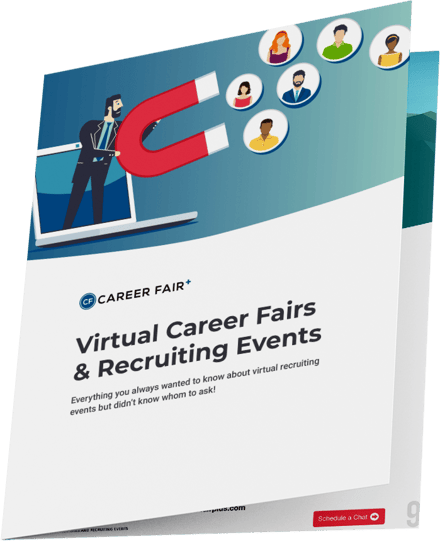Contingency plan… this seems to be the primary thought for our customers as they contemplate career fairs in the time of COVID-19 (Novel Coronavirus). In the near term, with lockdowns spreading across the world, a career fair is unthinkable. But in the months ahead there is great uncertainty as to when things will get back to normal. Fair organizers are faced with the unenviable task of planning in-person fairs for the Fall while also contemplating the possibility of a resurgence of the virus and continued travel bans. Many are turning to virtual career fairs as their best alternative.
Virtual career or job fairs mirror physical fairs in many ways. There is a list of employers participating as well as a date, along with start and end times. Students usually have a way to book a time to speak with employers either one on one or via an employer webinar. Students create a profile with a résumé which is usually shared with employers in advance. For the interaction with employers, virtual fairs may support voice, video, text chat, or all three options.
Here are some best practices for a successful virtual career fair:
- Keep it familiar
- Keep it simple
- Keep it flexible
Students and employers are used to in-person fairs, and what they offer. When moving to an entirely new paradigm such as a virtual event, you will want to keep as many things as familiar as possible to reduce confusion and anxiety.
In the same vein, you will want to make the process for registering for a spot and interacting with employers as simple as possible. While there are many fancy tools available, such as video chat, waiting rooms, etc, each new technology component introduces an additional opportunity for students and employers to miss a connection due to user error. Often, something as simple as an employer calling a student at a designated time can be the most convenient and reliable way to connect.
Flexibility is a key requirement in your overall contingency plan. It starts with the basics such as the access to technology and platforms. Employer representatives may be required to use certain video or meeting tools for their interactions with students because of security and firewall restrictions. Your virtual fair should be flexible enough to support the employers preferred connection method.
At a higher level, the entire event may need to be flexible. You may need to plan an in-person career fair that can convert to a virtual fair or vice versa should the situation improve. This requires a platform that has the flexibility to support both types of events without dramatically changing the interaction.
Career Fair Plus has focussed increasingly on supporting both types of events in our platform, with the ability to easily convert an in-person fair into a virtual one. We offer a reliable way to coordinate meeting times between students and employers, while offering employers the flexibility to choose how they communicate with candidates. Watch this video to see how a virtual fair works on Career Fair Plus.
Should you have any questions on this topic, please reach out to support@careerfairplus.com and we would be glad to host a call to discuss how we can help you host a successful in-person or virtual career fair.
